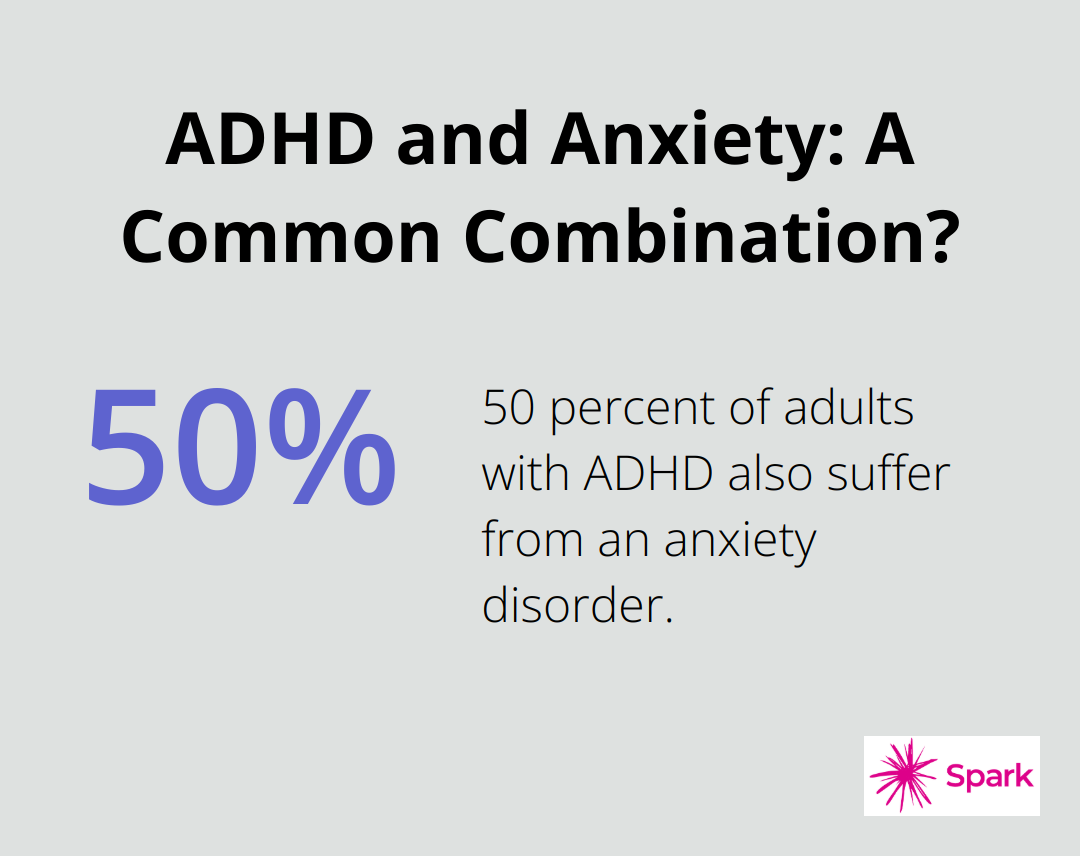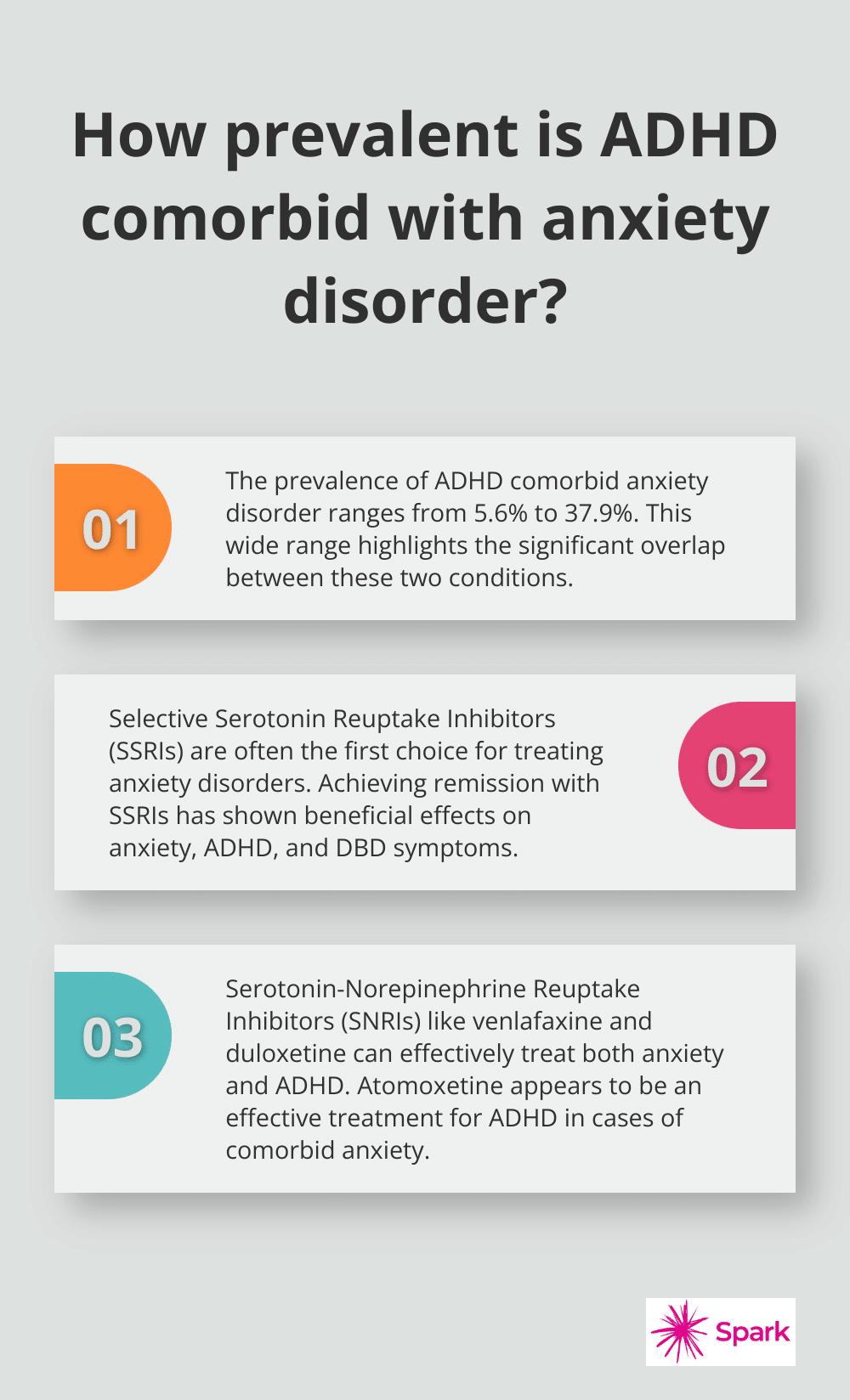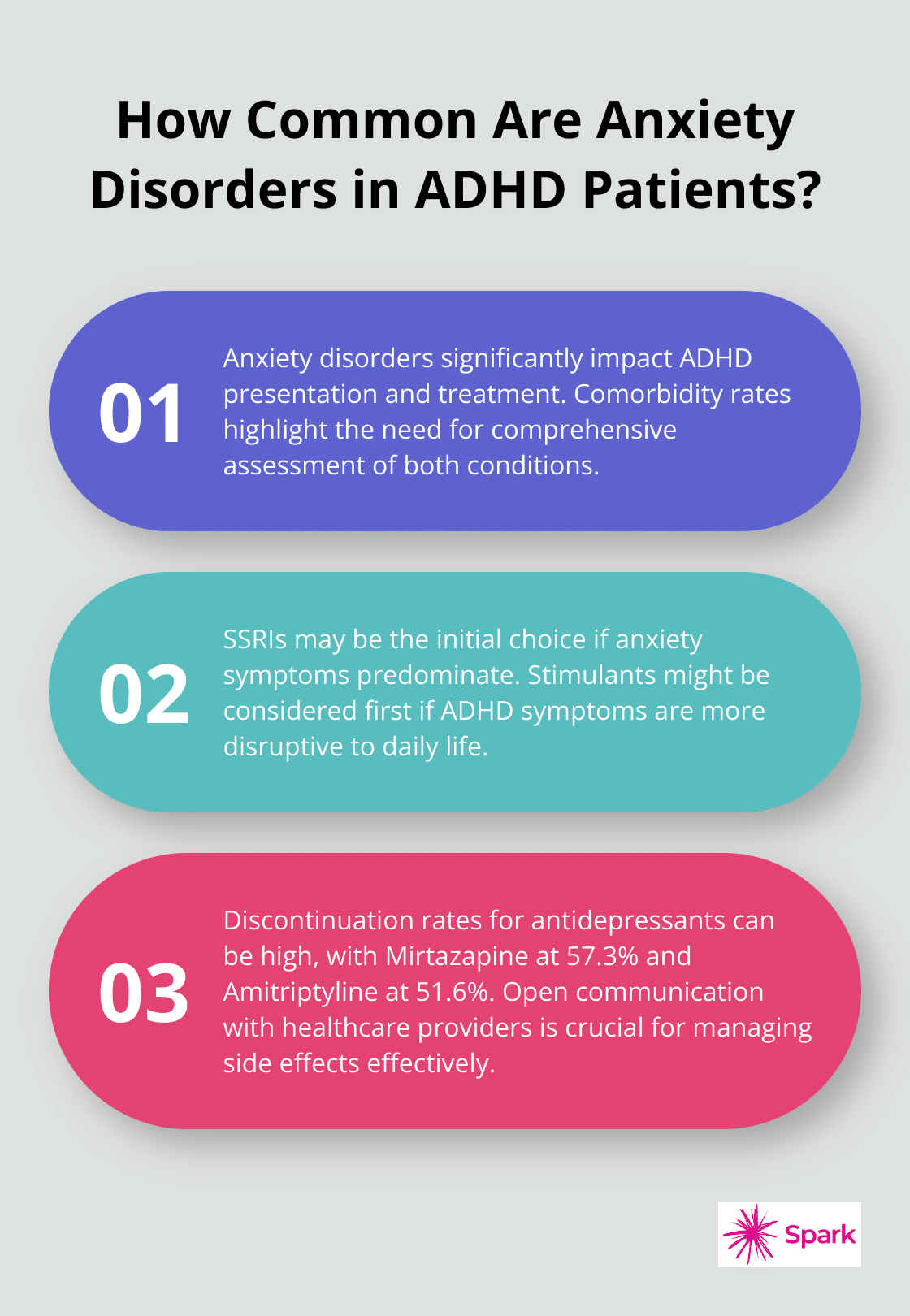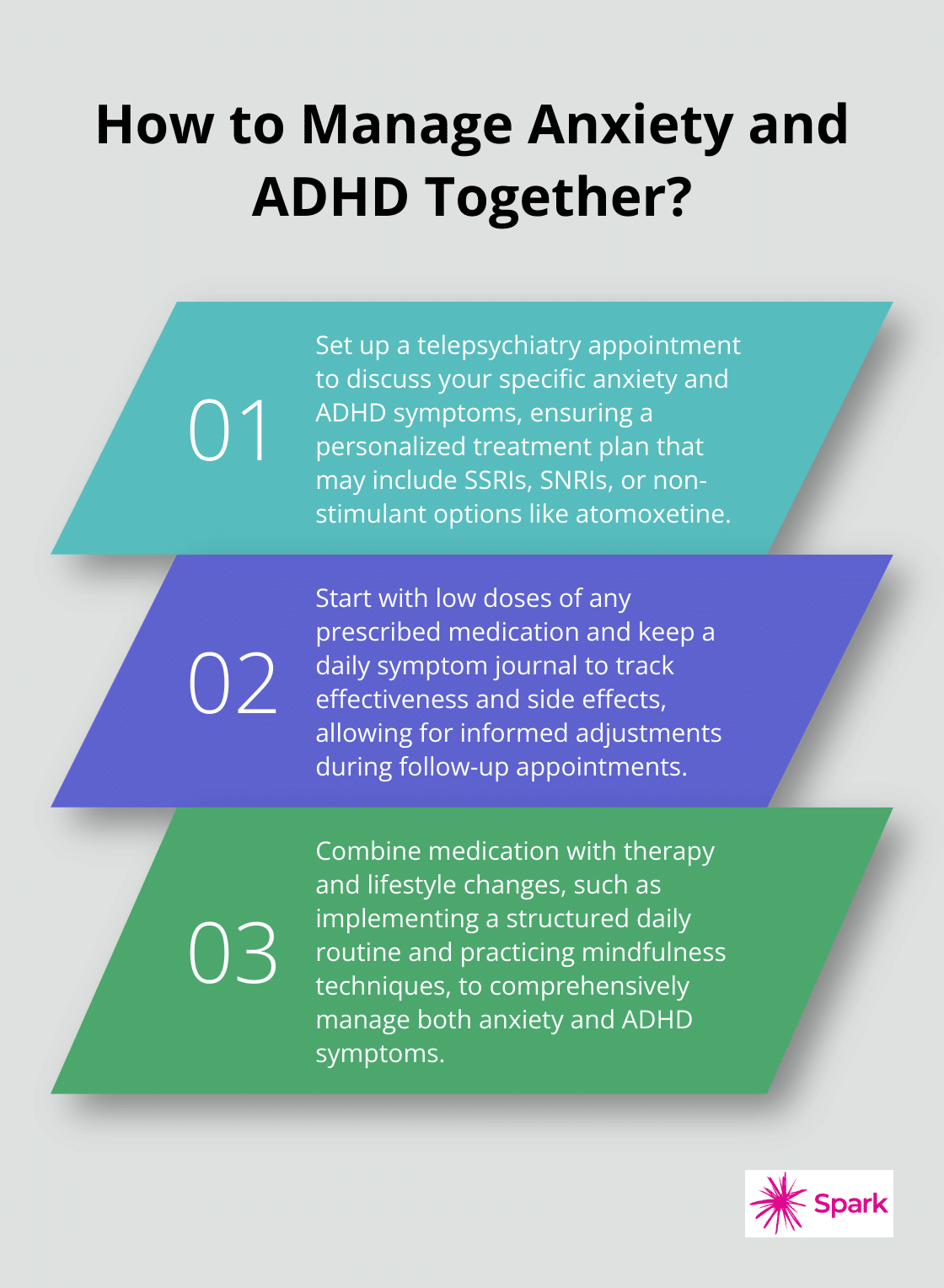Living with both anxiety and ADHD can be overwhelming. Many people struggle to find the right balance in managing these co-occurring conditions.
At Spark Mental Health, we understand the complexity of this situation and the importance of finding effective anxious ADHD medications. In this post, we’ll explore the best treatment options available, helping you navigate the path to better mental health.
Understanding Anxiety and ADHD Comorbidity
Defining Anxiety and ADHD
Anxiety and Attention-Deficit/Hyperactivity Disorder (ADHD) represent two distinct mental health conditions that often coexist, creating unique challenges for affected individuals. Anxiety manifests as excessive worry, fear, and unease, potentially taking forms such as generalized anxiety disorder, social anxiety, or panic attacks. ADHD involves difficulties with attention, hyperactivity, and impulsivity.
The Prevalence of Comorbidity
The overlap between anxiety and ADHD occurs with striking frequency. About 50 percent of adults with ADHD also suffer from an anxiety disorder. This high rate of co-occurrence points to a complex interplay between these conditions.
Recognizing Symptoms and Challenges
Individuals who experience both anxiety and ADHD often face a unique set of symptoms that can surpass the severity of either condition alone. These symptoms may include:
- Concentration difficulties due to racing thoughts and worry
- Persistent restlessness and inability to relax
- Procrastination (stemming from both anxiety about tasks and ADHD-related executive function issues)
- Sleep problems, including trouble falling or staying asleep
- Heightened emotional reactivity
Impact on Daily Life
The combination of anxiety and ADHD can significantly affect various aspects of life. At work, individuals might struggle to meet deadlines or maintain focus during meetings. In social situations, they may feel overwhelmed by social cues while also battling the urge to interrupt or speak impulsively.
Treatment Considerations
Managing both conditions requires a nuanced approach. While stimulant medications often serve as the first-line treatment for ADHD, they can sometimes exacerbate anxiety symptoms. Conversely, some anxiety treatments may not address ADHD symptoms effectively.

Telepsychiatry services can provide personalized care that accounts for the unique interplay of symptoms in each individual. Mental health professionals work closely with patients to find the right balance of medication and therapy, ensuring comprehensive treatment of both anxiety and ADHD symptoms.
As we move forward, we’ll explore the specific medications that can effectively address both anxiety and ADHD, providing a foundation for successful treatment strategies.
Effective Medications for Anxiety and ADHD
SSRIs: A Primary Treatment Option
Selective Serotonin Reuptake Inhibitors (SSRIs) often serve as the first choice for treating anxiety disorders. A study found that achieving remission had a beneficial effect on anxiety, ADHD, and DBD symptoms, regardless of the type of treatment received.
SNRIs: Addressing Multiple Neurotransmitters
Serotonin-Norepinephrine Reuptake Inhibitors (SNRIs) like venlafaxine (Effexor) and duloxetine (Cymbalta) can effectively treat those with both anxiety and ADHD. Studies have reported that the prevalence of ADHD comorbid anxiety disorder is 5.6–37.9%. Atomoxetine appears to be an effective treatment for ADHD in these cases.
Stimulants: A Careful Approach
While stimulants such as methylphenidate (Ritalin) and amphetamines (Adderall) primarily treat ADHD, they can sometimes worsen anxiety symptoms. However, for some patients, addressing ADHD symptoms with stimulants can indirectly reduce anxiety. It’s important to begin with low doses and monitor the effects closely.
Non-Stimulant Options: A Balanced Solution
Non-stimulant medications like atomoxetine (Strattera) and guanfacine (Intuniv) provide an alternative for those who cannot tolerate stimulants or have severe anxiety. Research indicates that tricyclic antidepressants have the most evidence for the treatment of ADHD in the non-stimulant category.
Personalized Treatment Plans
Finding the right medication requires a personalized approach. Telepsychiatry services (like those offered by Spark Mental Health) provide the flexibility to adjust treatment plans as needed, ensuring patients receive the most effective care for their unique situation. Mental health professionals work closely with patients to monitor side effects, adjust dosages, and find the optimal balance for managing both anxiety and ADHD symptoms.

Medication forms just one part of a comprehensive treatment plan. Combining pharmacological approaches with therapy, lifestyle changes, and support can lead to the best outcomes. As we move forward, we’ll explore the factors to consider when choosing the right medication for anxiety and ADHD comorbidity.
How to Choose the Right Medication for Anxiety and ADHD
Assess Symptom Severity
The selection of an effective medication for anxiety and ADHD comorbidity requires a thorough evaluation of symptoms. The specific manifestations and severity of both conditions vary significantly among individuals. If anxiety symptoms predominate, an SSRI might be the initial choice. However, if ADHD symptoms disrupt daily life more severely, a stimulant medication could be the first consideration.
Comorbidity rates emphasize the need for a comprehensive assessment. Anxiety disorders may substantially change the presentation, the prognosis, and the treatment of ADHD itself.
Navigate Potential Side Effects
All medications carry potential side effects, and it’s important to weigh these against the benefits. Stimulants like Adderall can sometimes worsen anxiety symptoms in some individuals. SSRIs, on the other hand, might cause initial jitteriness or sexual side effects.

A study found that among ten antidepressants studied, the highest discontinuation rates were observed for Mirtazapine (57.3%) and Amitriptyline (51.6%). This statistic highlights the importance of open communication with your healthcare provider to manage and mitigate side effects effectively.
Understand Drug Interactions
The consideration of potential interactions becomes vital if you take other medications. For instance, the combination of certain SSRIs with stimulants can increase the risk of serotonin syndrome (a potentially serious condition). Your healthcare provider should review your current medications and medical history to avoid harmful interactions and ensure safe treatment.
The FDA reports that serious drug interactions occur in 6.7% of hospitalized patients. While this statistic isn’t specific to anxiety and ADHD medications, it emphasizes the importance of a thorough medication review.
Consider Patient Preferences and Lifestyle
Your personal preferences and lifestyle factors play a significant role in medication selection. For example, if you have a history of substance abuse, non-stimulant options for ADHD might be preferable. Similarly, if you have a demanding job that requires peak cognitive performance, a medication with minimal sedative effects might be more suitable.
Collaborate with Your Healthcare Provider
The selection of the right medication requires a collaborative approach. Telepsychiatry services allow for ongoing communication and adjustment of your treatment plan as needed. Your healthcare provider should work closely with you to monitor the effectiveness of your medication, address any concerns, and make necessary changes to optimize your treatment outcomes.
Treating ADHD has been shown to prevent worsening comorbidities with depression, bipolarity, anxiety and substance use disorders.
Final Thoughts
Managing anxiety and ADHD comorbidity requires a personalized approach that addresses each individual’s unique needs. The search for effective anxious ADHD medications can be complex, but it represents a vital step towards improved mental health. Combining medications with therapy often produces the best results, as cognitive-behavioral therapy can provide valuable tools for symptom management and skill improvement.

Telepsychiatry has revolutionized the treatment of anxiety and ADHD comorbidity by offering convenient access to mental health care. It allows for regular check-ins and medication adjustments without in-person visits, which benefits those who struggle with time management. This flexibility enhances the overall treatment experience and improves adherence to care plans.
Spark Mental Health offers telepsychiatry services that provide personalized care plans and medication management. We strive to make effective mental health support available to those who need it through flexible online scheduling. Finding the right treatment for anxiety and ADHD takes time and patience, but with proper support, it’s possible to manage both conditions effectively.






